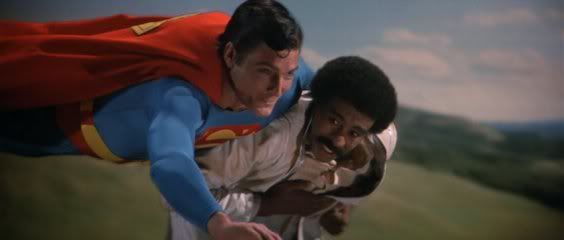Superman, you're just in a slump. You'll be great again!

In the book Getting Away With It, which alternates between excerpts from Steven Soderbergh's journal dating from his self-imposed exile from Hollywood in the mid-'90s and a series of interviews he conducted with Richard Lester around the same time, Lester said of the Superman films, "The problem with all the films is that you have to make him destructible briefly, and then make him indestructible at the end. Now, three times, you're getting a bit bored with that." Even so, having completed Superman II after original director Richard Donner had a falling out with producers Alexander and Ilya Salkind, Lester chose to stick around and make Superman III because, he said, "I really was enjoying the experience and I thought it was a good thing to be doing." And while the result was something of a comedown after the high of Superman II, at least it's not a colossal bore like Supergirl or embarrassingly cheap like Superman IV: The Quest for Peace.
In fact, if one were to describe Superman III, words like "boring" and "cheap" would not be ones that come to mind, although "embarrassing" might considering how much screen time is given over to Richard Pryor, whole role as bumbling computer genius Gus Gorman seems misguided at best. Lester's comic touch is better utilized in the opening credit sequence, which is the most inspired example of Rube Goldberg-like slapstick I've ever seen in a motion picture, as well as a running gag about a hapless Pisa street vendor played by Lester stock company member John Bluthal. The best part of the film, though, is when Superman is exposed to some synthetic Kryptonite (now with 0.57% tar!) and Christopher Reeve gets to have some fun with the role, pretty much turning him into an apathetic dick. Then, of course, there's the brilliantly choreographed junkyard brawl between the virtuous Clark Kent and the evil Superman. It's the kind of sustained action scene that these kinds of movies were built for and Lester carries it off like a champ.
To be fair, the film has other bright spots. Pamela Stephenson makes the most of her role as a buxom blond (and "psychic nutritionist" to the film's villain, super-rich industrialist Robert Vaughn) who plays dumb but is actually seen reading Kant's Critique of Pure Reason at one point. And during the sequence where Pryor attempts to tap into a weather satellite for nefarious purposes there are some unexpected side effects: an ATM starts spontaneously spitting out wads of money, one woman's Bloomingdale's account balance is grossly inflated, inspiring her husband to reenact the grapefruit scene from The Public Enemy, and some traffic signals go awry, spurring the red and green men on the "Don't Walk" sign to start tussling. Less successful is the scene where Pryor impersonates a three-star general and blusters his way through a rambling speech, even echoing George C. Scott in Dr. Strangelove at one point ("We cannot afford a chemical-plastics gap!") before delivering the tainted Kryptonite to Superman. A lot less of that sort of thing would have gone a long way.